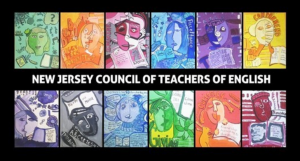We invited the NJCTE members who were awarded a grant to attend NCTE 2021 to share a reflection on their experiences at this year’s virtual convention. The third of three appears below, written by Marisol Ruiz:
I look around my classroom library and see the abundance of contemporary diverse literature that I offer my students. They have the many options that I lacked growing up. Thankfully, authors like Kelly Yang, Linda Sue Park, Jason Reynolds, Nic Stone, Erika Sanchez, Elizabeth Acevedo, and many, many more have changed that for today’s youth and the many adults that still need their experiences validated through these social justice warriors’ stories. These authors create spaces that allow individuals to feel and better understand their experiences, while granting them permission to also tell their stories, their way, and not the way the dominant culture has enforced over time.
As a teacher, everyday I walk into the classroom and hope to make a difference in the lives of my students. I look at their individual faces and see the potential that each brings to our classroom. Their experiences and cultures make for a rich and engaging environment that builds self worth and validates who we are as individuals. Overall, I strive to create an environment that fosters and nurtures lifelong learners by helping students find their voice and tell their stories. My actions are always intentional, from the vulnerabilities I share to the stories I select, all are aimed to create individuals that see their reflections in books, find windows into different worlds, and slide into the thoughts of strangers that become family.
This year’s NCTE Convention focused on bringing equity, justice, and antiracist teaching into the classroom to help meet the academic and social emotional needs of students in order to reach their full academic potential. Workshops provided educators the tools and guidance that one needs to help students find their voice by examining rich inclusive mentor texts and writing workshops that explore the multiple identities that students carry. Linda Sue Park’s passionate words, “Injustice and inequity flourish when not enough of us share our stories, and when those stories are not shared enough,” remind us of the important role that ELA teachers possess. WE need to help our students build their voice and craft as writers. Our students are the next generation of Jason Reynolds, George M. Johnson, Tiffany Jackson, David Bowle, Rex Ogle, and Tehlor Kay Mejia.
